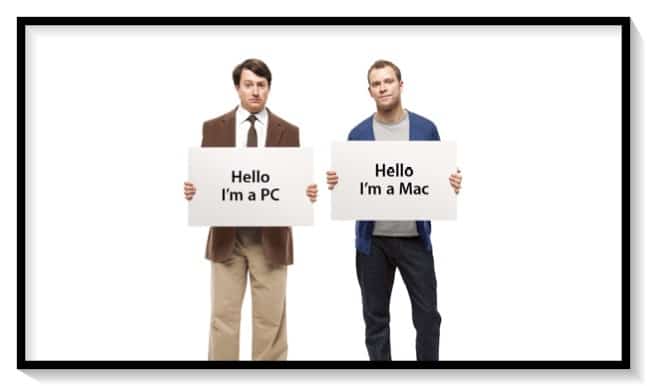Over the past few weeks it has astonished me how many people in the higher education sector fail to distinguish between ‘good’ and ‘good value’.
In fact, it cuts at the heart of universities’ defensiveness in the face of ever more pressing questions and scrutiny over their activities. So perhaps the matter is best illustrated with an over-extended metaphor.
Consumer dilema
I have just purchased a new laptop computer. Broadly, I had two main options available to me when making this not inconsiderable financial purchase: Apple, or Microsoft.
Apple Macbooks are great. They are sleek, intuitive to use, sync well with other devices, have access to a wide range of high quality software, improve my productivity and give me a nice warm fuzzy feeling whilst using them. When matched for hardware, they are generally, to my mind (and I think for many casual users), better than a PC.
But they are also damned expensive. A new Macbook will set me back around £1200. A Windows laptop with an equivalent processor, RAM, and hard disk space will cost me only a little more than half of that. When push comes to shove, I cannot justify spending an extra £500-£600 on a Mac. That’s a week’s holiday in the Med, or a significant proportion of a month’s rent. Deep down, I think I want a Mac. To me, it is better than a PC, but it just isn’t worth the extra cash.
The PC is good, and does most of what I need it to do, but perhaps a little less efficiently, and certainly with less ‘brand value’ for posing in coffee shops. For some jobs – creative design or video editing perhaps – the Mac really is essential. But I have no intention of doing these, so I save my money and purchase the PC.
A thought experiment
Now, imagine that owning a Mac became an effective precondition for getting 80% of middle-class, stable, well-paying jobs. There might be a chance of getting into one of these careers without a Mac, and it was far more common in days gone by, but now, employers have discovered (encouraged by the government) that they can make owning a Mac part of the ‘essential criteria’ on most jobs that I would be interested in having. Importantly though, having a Mac won’t guarantee me one of these jobs. It’ll just give me a significantly better chance of obtaining one than if I didn’t have a Mac.
Well, I now have little choice but to buy a Mac, though my parents never dreamed of owning one in their day. And I enjoy it. In fact, nearly half the population now has to buy a Mac. They also enjoy them. 84% of users say they are satisfied with their Mac. They are sleek, easy to use, intuitive, increase everyone’s productivity a bit, and give users a warm fuzzy feeling. Research (admittedly, carried out by Apple) shows that Mac users live longer, smoke less, exercise more, are more active citizens, more likely to vote, and more open minded.
But they still cost £1200. In fact, Apple would charge more if they could get away with it – they often do, adding fees for critical accessories. They argue that Macs are very expensive to produce. But the government, recognising that the labour market would be unfair if Macs are a prerequisite to most good jobs, agrees to stump up an income contingent loan of £1200 for people to buy them. If you earn enough in your future job, you pay the loan back. If you don’t earn enough, the government will write it off.
Though this effectively creates a price-cap for Macs, this is great news for Apple. Suddenly, demand for Macs spikes – every aspiring employee wants one, and can get one. ‘Mac participation’ hits 50%. It would hit more, but only recently did the government lift a cap on the number of loans it was willing to provide for Macs. Now it has done so, Apple is desperate to sell as many Macs as it can get away with.
It’s also good for employers. Macs become essential criteria for many more middle-class jobs, and they can rely upon their workers having them. They’re not necessarily essential for doing the job, but they do make the workers marginally more productive, and if you can get workers with them, you might as well take them. Apple keeps selling more and more Macs, which makes them even more essential for aspiring employees. The sorting mechanism of high Mac ownership begins to outstrip the added value to productivity and the wider economy.
Upseting the Apple cart(el)
After a few years of this, some commentators and esteemed economists start asking some difficult questions of Apple. Sure, it’s nice that more people have Macs now, and they’re all very happy with them. But is it really worth the enormous expense? A larger and larger amount of people who take out the government loans to buy their Macs can’t pay them back. The cost to the taxpayer is growing. And the cost is also higher for those who do pay their loans back, as the interest rate is very high in order to cover the cost of those loans are written off.
For those employees previously accustomed to the very top jobs, there is another problem. Once upon a time, they were the only ones who had Macs, as they were the only ones who could afford them. But now nearly everyone has a Mac, eliminating their competitive advantage. So more of them start buying even higher spec Macs in order to distinguish themselves. When those in the middle-classes who find these higher spec machines just a little out of their price range feel left out by this, the government, eager not to lose their votes, introduces another income-contingent loan to pay for these. Demand duly increases.
Everyone starts getting a bit annoyed with Apple. They seem to do great out of the deal. In fact, their main competitors – PC manufacturers – have done disastrously out of the new arrangement. Whilst struggling PCs are more likely to serve working-class communities, Apple is now king for all aspiring middle-class workers. Financially, all is well. They are justifiably quite proud of themselves. ‘84% of users say they are satisfied with their Mac’, they say. In fact, ‘research shows that Mac users live longer, smoke less…’ – you get the idea. It is clear to Apple that their Macs are a ‘good thing’.
But the aforementioned commentators are still unhappy. Why – they ask – has the government underwritten a system that guarantees them unlimited business? Is it fair that under such a system Apple’s senior managers are so well remunerated? And given their business is now guaranteed, how do we know Apple is still producing Macs to consistently high standards in return for this generous settlement?
They suggest that, perhaps, not everyone needs the high expense Macs in order for the economy to succeed. Some wonder whether Macs could be made more cost efficiently. Others suggest that Apple could provide smaller Macs at a lower cost. Perhaps the loans for Macs could be once again restricted to only those workers for whom they will have a demonstrable productivity benefit? Or perhaps the fees for Macs could be differentiated depending on the salaries of the workers that buy them? Others even suggest that the market for PCs – crushed since Macs became de rigeur – could be revived if funding arrangements were reformed.
‘Philistines!’, cry Apple’s defenders and employees. Macs are wonderful, and there’s a lot of evidence to prove it. For many workers, they really are absolutely essential. Doctors need Macs. So do teachers, nurses, economists, engineers. Macs are vital to the country’s economy, but they are also great for a functioning civil society. It shouldn’t matter how much Mac owners get paid; more Macs makes things better for all of us!
‘Very well’, retort the critics, but could we not get 80% or 90% of these benefits for half the cost? Maybe from a PC? Are we sure that the net benefit is worth the extortionate cost? Could not resources be more efficiently allocated? Was the expansion in Mac ownership premised on some problematic economic assumptions? One summer, a string of newspaper columnists and attention seekers with little better to do line up to slate Apple. They are accused of running a ‘cartel’ and a ‘ponzi scheme’.
And so the debate rumbles on. Apple needs to learn that, as long as their business is underwritten by the taxpayer, and as long as their product is an essential positional good, the high cost of £1200 (plus accessories) will be questioned. Are they really confident that what they do cannot be done for cheaper? Are they really transparent about their costs? Are their Macs really as efficient and as effective as they could possibly be?
Should Apple really be so defensive about growing public concern and calls for tougher regulation? Are their calls to sell even more Macs little more than naked self-interest? And given the funding arrangement, should their executives behave more like (and be paid more like) senior civil servants rather than high-flying corporate executives?
For if the government eventually concludes (as I did) that, although a Mac is maybe better, it is simply too expensive, Apple (for all the good that it does) could well find itself an easy target for lampooning, and increasingly mistrusted (which is perhaps how you feel now about this metaphor…). Remind you of anyone?














Thanks, David – another excellent blog. Over recent months, questions have been raised about the culture, policies and behaviours of the HE sector. Too often, the response has been either dismissive – it’s stupid to question VCs’ salaries – or generic – on average, graduates do well in the labour market. I tweeted that universities enjoyed an unplanned windfall after the introduction of higher tuition fees. This was on the basis that the government expected fees to average £7,500 pa, when in fact most HEIs went straight to £9,000. Most responses were dismissive: I was wrong, because higher fees merely… Read more »
Within 2-3 more development cycles, a Chromebook will be even cheaper than a PC and even slicker than a Mac, and its stupendous rise in schools will drive younger users’ expectations for a totally new way of doing things. That ought to sort it!
We need to ensure parity of esteem of Chromebooks and Macs, for too long neglected by successive governments.
As a Mac user, tax payer, and a “mature” master’s degree student I really struggle with all of this. Thanks for the great post!
I’ve got a couple of late-2008 iMacs in regular use at home. They are amazingly reliable and we still get a huge amount of value, and indeed enjoyment, from using them. Good investment (certainly better than the Sony Vaio that lasted a year). Longevity and reliability is what we have come to expect from Apple. And I’ve got a 1994 vintage degree from a Russell Group university. Excellent vintage. Still used everyday. And perhaps unlike the Mac, its value just increases with time and experience – for me and for the society I serve. The difference is the iMacs are… Read more »
I think the problem with this is the metaphor, which simply doesn’t work. There’s really no evidence that market forces work in Higher Education, for reasons that Martin Wolf makes clear here-
https://www.ft.com/content/20d18f64-d567-11e5-829b-8564e7528e54
A fundamental difference is that Apple would know exactly how much it actually costs to produce that single Macbook. Unfortunately universities usually won’t know the full cost (not just direct cost) of delivering an individual course. There is quite a bit of hidden cost from overhead and cross-subsidization (courses shared by schools and academics performing research etc.). So it makes it difficult to determine whether the delivery of the course could be made more efficient, but if they were to cut cost from delivering teaching would that impact the price (tuition) or reinvested in research? At the moment there may… Read more »